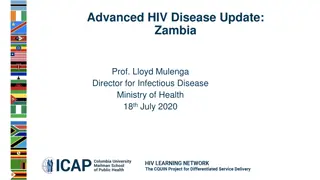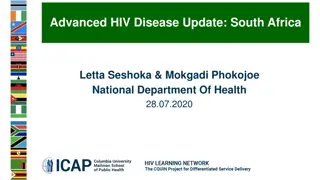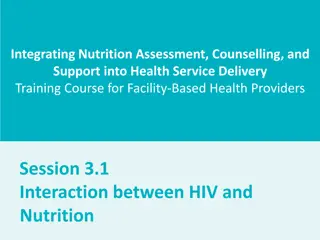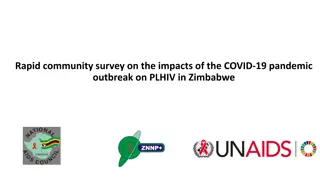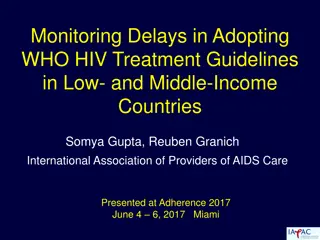Region X HIV Programme
Overview of the Region X HIV Programme, including data on population, PLHIV, and the HIV care cascade. Mobilizing, testing, linkage, ART initiation, treatment and retention, challenges among specific populations, and other challenges are discussed.
6 views • 9 slides
Update on Advanced HIV Disease in Zambia: Prof. Lloyd Mulenga Shares Insights
Prof. Lloyd Mulenga, Director for Infectious Disease at the Ministry of Health in Zambia, provided an update on Advanced HIV Disease (AHD) in the country. The update includes progress towards the 95-95-95 target, prevalence of AHD, mortality rates among PLHIV, coordination of AHD services at the nat
2 views • 16 slides
Integrating Sanitation and Handwashing into PEPFAR Programming
Why Wash matters for PLHIV due to the significant impact of diarrhea on individuals living with HIV/AIDS, affecting absorption of antiretrovirals and nutrients, causing burden on caregivers, and reducing quality of life. Critical WASH behaviors like safe feces disposal, water treatment, and handwash
0 views • 13 slides
Update on Advanced HIV Disease in South Africa
Update on advanced HIV disease in South Africa highlights progress in reducing AIDS-related deaths, prevalence rates, and advancements in coordinating and implementing policies and guidelines for HIV/AIDS response. The report covers statistics on HIV prevalence, ART facilities, mortality rates, and
0 views • 17 slides
Understanding the Impact of HIV on Nutrition
This training session focuses on the relationship between undernutrition and HIV, discussing how HIV/AIDS affects nutrition among People Living with HIV (PLHIV). It covers the benefits of good nutrition for PLHIV and provides recommendations for Nutrition Assessment, Counselling, and Support (NACS)
1 views • 27 slides
Rapid Community Survey on COVID-19 Impact on PLHIV in Zimbabwe
This rapid community survey in Zimbabwe assessed the impact of the COVID-19 pandemic on people living with HIV (PLHIV). Conducted online through platforms like SurveyMonkey and WhatsApp, the survey focused on access to preventative materials, HIV treatment, information on COVID-19 prevention, and ps
0 views • 30 slides
Monitoring Delays in Adopting WHO HIV Treatment Guidelines in LMICs
Scientific evidence supports immediate ART in preventing illness and deaths. WHO guidelines, revised in 2015 to recommend treating all PLHIV regardless of CD4 count, have seen delays in adoption at the national level in low- and middle-income countries (LMICs). This study quantifies delays in adopti
0 views • 14 slides

